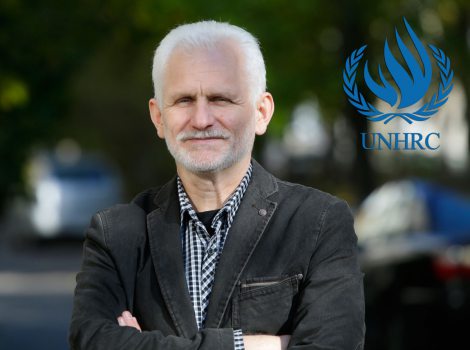Ales Bialiatski: “I took the decision of the UN Human Rights Committee as a personal satisfaction” (full text of the document)

United Nations Human Rights Committee adopts a landmark decision in the case of Ales Bialiatski. Photo: Siarhei Hryts
The Human Rights Center “Viasna” publishes the official text of a decision taken by the United Nations Human Rights Committee in the case of its leader and vice-president of the International Federation for Human Rights, Ales Bialiatski.
Having considered the individual communication in the case of Ales Bialiatski, the United Nations Human Rights Committee found that the sentencing Ales Bialiatski to a lengthy prison term for actions associated with the receipt and expenditure of funds aimed at carrying out the legitimate activities of his organization was the direct result of violations of freedom of association and imposing criminal liability on Ales Bialiatski was a violation of the right guaranteed by Article 22 of the International Covenant on Civil and Political Rights. The Committee also recognized that the State had violated Article 9 (the right to liberty and security of the person) and Article 14 (the right to justice and a fair trial). The decision of the Committee states that Bialiatski is entitled to legal remedies: reconsideration of Viasna’s application for state registration, clearing of his criminal record, adequate compensation, including reimbursement of fines paid in accordance with judicial decisions. Furthermore, the Committee found that the State should review its laws on associations and bring them into accord with Article 22 of the ICCPR.
Ales Bialiatski views this decision as a personal satisfaction. “I took this decision of the UN Human Rights Committee as a personal satisfaction, because it proves my innocence, what I have been trying to prove all these years – before imprisonment, during the trial and during my imprisonment. Today, the United Nations Human Rights Committee is the highest international court for the Belarusian society, and the Committee is composed of lawyers from different countries, so their evaluation is perceived as unbiased and authoritative. So, of course, I am pleased that my position really is not incorrect and that the international community regarded the verdict as unfair. So I feel very confident.”
The human rights defender also emphasizes that the decision is for him primarily a sign of moral support. “Of course, the UN Human Rights Committee’s decisions are not executed by the Belarusian authorities, so what they bring is rather moral satisfaction, they are moral definitions. After all, we can hardly expect that will achieve the abolition of the sentence of Belarusian courts on the basis of this decision, in the current situation when Belarusian courts depend on the executive power. At the same time, the HRC decision emphasizes the political motivation of the sentence, that it is not an unbiased, not a just verdict, but a politically motivated one.”
The decision of the UN Committee in the case of Ales Bialiatski has gained international attention and in this context the human rights activist has some hopes. “Whatever is said by the Belarusian authorities, no matter how hard they could pretend that the decision does not apply to them, such things smash the image of “the independent Belarusian court”. And in subsequent considerations of such political cases, at least I would like to think that the Belarusian authorities will be more careful not to persecute human rights defenders and civil society activists for our activities. There’s one more thing – human rights defenders in other countries, not only post-Soviet ones, have been convicted on similar charges. We saw such sentences in Azerbaijan and Iran, they are also looming in Russia. And this decision can indeed serve as a justification for the protection of human rights defenders and civil society activists, who may find themselves in similar situation in other countries. At least, this is a clear message from the United Nations Human Rights Committee that such sentences do not have any prospects to be justified and accepted as legitimate by the wider international community, which includes not only the European countries, but in fact the whole world. So maybe other states will have more respect for a risk of non-recognition of such political convictions. Hopefully, this will limit the arbitrariness of governments in authoritarian countries.”
Ales Bialiatski was arrested on August 4, 2011 on charges of “large-scale tax evasion” and sentenced on November 24, 2011 to four and a half years imprisonment in a penal colony. After nearly three years of imprisonment, the human rights activist was released on June 21, 2014, the first day of an amnesty, which he had been denied for two years over “numerous violations of prison rules”. Over the years of imprisonment, the European Union, the United States and international human rights organizations demanded that the authorities of Belarus unconditionally released the prisoner of conscience. In August 2012, the Working Group on Arbitrary Detention of the United Nations Human Rights Council adopted a decision in the case of Ales Bialiatski, recognizing his detention arbitrary.
Official text of the United Nations Human Rights Committee’s decision in the case of Ales Bialiatski:

















